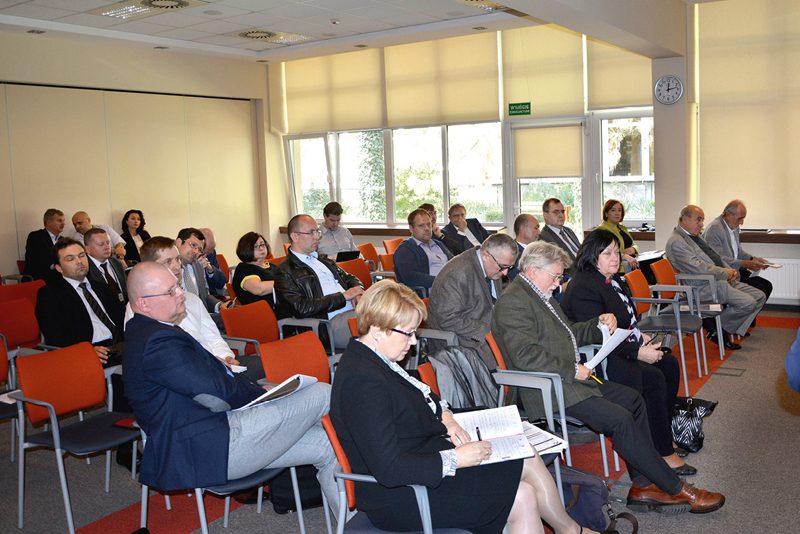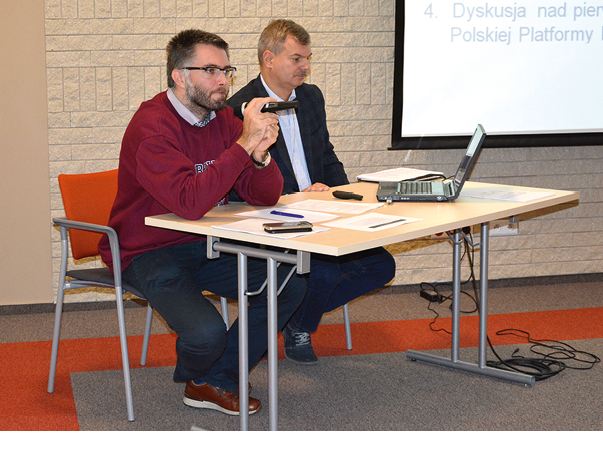
Polish Industry 4.0 Platform
The Ministry of Development has started work on creating a Platform for the development of Industry 4.0. On September 22, 2016 two working groups of the Industrial Transformation Group set up by the Ministry have met at the Industrial Research Institute for Automation and Measurements PIAP – group for the digital support for the industry and group for education, competencies and human resources for Industry 4.0.

Three representatives of the Ministry of Development participated in the meeting from the Department of Innovation: Deputy Director Mr. Jan Staniłko – who led the meeting, Head of the Department of the Industrial Policy Mr. Krzysztof Zaręba and Alicja Wołukanis, PhD. Eng. – chief specialist of the Department of the Industrial Policy.
The main goals to be achieved by the end of the first quarter of 2017, include: establishment of the institutionalised Polish Platform for Industry 4.0 and creation of an agreement – as a consortium or otherwise – for close cooperation in the field of industrial transformation.
Key success factors will be: provision of the adequate legal regulations, particularly in the area of data processing – in this case, cooperation with the Ministry of Digitalisation will be of a great importance – and support for science, as one of the major challenges will be to provide teachers and lecturers with an access to the modern knowledge ie. to educate the relevant staff. Currently the Industrial Transformation
Group has six working groups:
- group 1 for standardisation and integrated digital infrastructure as well as the development of intelligent industrial specialisations,
- group 2 for the digital support of the industry,
- group 3 for the intelligent software and data processing,
- group 4 for the education, competencies and human resources for Industry 4.0,
- group 5 for the legal framework of Industry 4.0 and
- group 6 for the ICT statistics and services.
The Industrial Research Institute for Automation and Measurements PIAP actively participates in the work of Groups 2 and 4.
During the September meeting Prof. Piotr Szynkarczyk, Director of PIAP said: We can say that we are already working in the Industry 4.0. Implementations in the industry are in the core of our activity, which is backed with a long-standing tradition – we have been operating since 1965. Summarising our recent activity, we have come to the conclusion that the processes associated with the Industry 4.0 are already happening for us – they have emerged as a natural element on the way of the Institute’s development, with each step, such as the introduction of mobile robots for special applications.
Two PIAP representatives were elected as chairs of the two groups (2 and 4): Prof. Roman Szewczyk, PIAP’s Secretary of Science, who chairs the work of the group for the digital support of the industry, and Małgorzata Kaliczyńska, PhD. Eng., Deputy Editor-in-Chief of ” Measurements Automation Robotics ” quarterly and “Automatyka (Automatics)” monthly, who will coordinate the work of the group for the education, competencies and human resources for Industry 4.0, supported by the Vice-Chair of the Group – Ewa Mikos-Romanowicz, business development director in Siemens.
The groups also include: Andrzej Soldaty, independent expert and creator of the Initiative for Polish Industry 4.0, Patryk Koć, Director’s Plenipotentiary for Projects in PIAP; representatives of the National Institute of Telecommunications, The Chamber of Digital Economy e-Commerce Poland and The Polish Chamber of Commerce for High Technology (IZTECH) as well as representatives of companies from various industry sectors, including Comarch and KUKA, as well as technical universities from Poznan, Warsaw and Wroclaw.
The scope of interest of the group for the digital support of the industry covers aspects such as:
- specification of the infrastructure requirements for industrial digitisation,
- digital business management models (operation centres for remote monitoring and technology operations in enterprises and technologies for teleoperation of 2D and 3D visualisation supporting management of technological operations and whole enterprises),
- reliability of production systems, proactive machine maintenance;
- energy efficiency of the factory (as well as efficiency in exploitation of other resources),
- optimisation of the factories operation, flexible factories (build anything anywhere),
- support of the factory worker with new technologies (robotisation, automation of production processes, monitoring and adjustment of the working conditions, work safety and ad-hoc raising the qualifications, human-machine and machine-machine collaboration),
- closed digital product lifecycle,
- personalised products, products sold as a service,
- cross sectoral integration via digital support, industrial cybersecurity,
- digital business management models, required skills and necessary human resources,
- defining the necessary skills to use new tools in the industry digitisation programmes under implementation.
The Group 4 for the education, competencies and human resources for Industry 4.0 is primarily concerned with:
- identification of the industry needs for the human resources with specific competences,
- the required skills and necessary human resources for the development of Industry 4.0 and services and definition of scope for the middle and higher level professional education courses and digital competence centres.
You can contact the groups 2 and 4 by email: mkaliczynska@piap.pl, rszewczyk@piap.pl, ewa.mikos@siemens.com.



